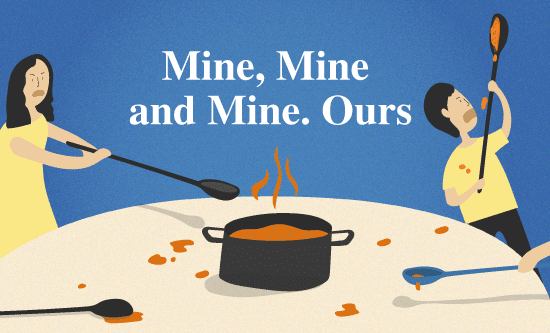Little kids often say ‘mine’ and as parents we encourage them to share. Why? Because as humans, we intrinsically believe that sharing is good with an instinctive belief in reciprocity. If you give first, you will receive later. We tell our children, “You have more than you need” to share with your siblings or friends. Our communal instincts tell us that everyone in a community gains through sharing and that the whole is greater than the sum of the parts. These are fundamental lessons that we teach our children because we instinctively believe as parents that people who share, gain more and as a result, are better human beings
Yet, ironically as we pass from childhood to adulthood we remember these lessons in our social life but forget them in our business life. Because business is war, and war is about domination, destruction and control. But what if it wasn’t? What if business was about people and the community and what if we extended these concepts of reciprocity, community and sharing into our business lives? What if we explored ways where if businesses shared, they could collectively gain more?
Which brings me to ‘The Parable of the Long Spoons’ – there are 2 identical rooms with 2 metre long spoons and in the centre of the table, a pot of food. In the first room, it’s messy, there is food everywhere, people are hangry and struggling to eat because the spoons are too long and awkward to eat with. Whereas in the second room, the people are happy and well fed, the room is neat and tidy. The difference between the 2 rooms is that in the first room, people tried to use the long spoons to feed themselves and in the second room, people collaborated and fed each other from across the table.
The world is full of evidence that tells us that collaboration and sharing creates better outcomes than individualism and greed so why are businesses so protective of their customer bases? Is it based on a notion that your customer base is a property right and that customers are owned by one organisation or another? This is inherently untrue. Think about a rice paddy, the farmer owns the paddy, he owns the rice plants and at the end of the season, he owns the rice. Throughout the growing season, he uses the water from the stream to irrigate his paddy, the water flows through his paddy into the next paddy and so on. The water from the stream is a shared resource, if farmers don’t share it, only the first farmer will survive but because they share it, all the farmers survive. Customers are like water, you own your shops, you own your stock, you own the database software, but you don’t own the customers, they just flow through your system nourishing it and then moving on.
Businesses that come together to share their customers like a rice paddy, will inevitably do better than ones who treat their customer base like a fortressed island. Sharing when it comes to customers, will be the new black.
 by Regan Yan, the CEO of Digital Alchemy.
by Regan Yan, the CEO of Digital Alchemy.
Regan is a subject-matter expert in analytical database marketing and customer relationship marketing, as well as an in-demand presenter and keynote speaker at national and international events. He also authors thought leadership pieces on data-driven marketing that can be found on the DA Blog.
